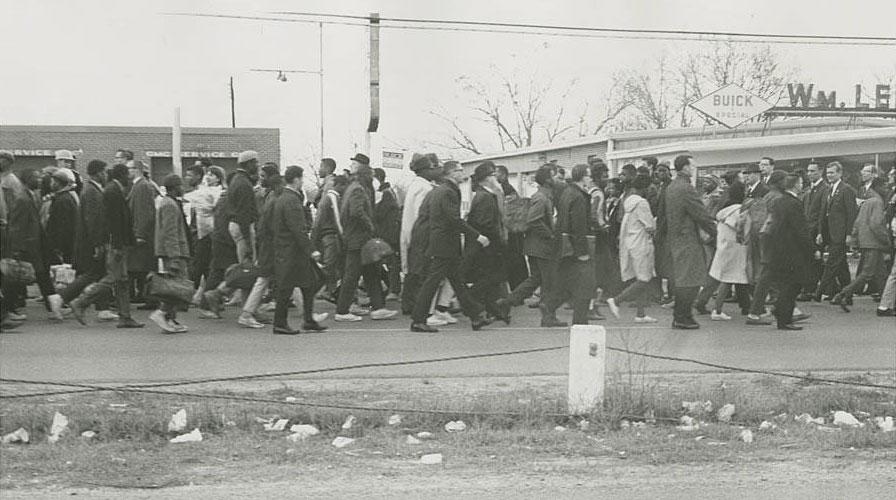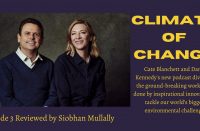The movie Selma was released earlier this month to widespread critical acclaim. While the film is beautifully made and relatively true to the history it is based on, there’s another achievement that most people overlook in the film.
The movie Selma was released earlier this month to widespread critical acclaim. While the film is beautifully made and relatively true to the history it is based on, there’s another achievement that most people overlook in the film. Telling the story of the 1965 Voting Rights Marches from Selma to Montgomery, the storyline of Selma is steeped in lessons in organizing and movement strategy, including some big ones for people across Canada planning to stop tar sands pipelines and restore some level of climate sanity in our government.
Of course these lessons are not about pretending that our movement is the same as the struggle for civil rights, or any other past or present movement, but we should be constantly learning from the successes of past movements, both to acknowledge their work and to help us achieve our goals.
Governments and institutions had changed the rules of the game in order to prevent the people from being able to express their democratic rights.
The second scene in the film depicts Annie Lee Cooper, played by Oprah Winfrey, attempting to register to vote. In the film, Cooper arrives at the Selma courthouse to register and is met by an antagonistic clerk who forces her to answer a series of questions before allowing the process to begin. First she is told to recite the preamble to the US constitution, then asked how many judges sit in the state of Alabama, and finally when she is unable to name all 67 judges in the state, her registration is denied.
This scene set up the initial conflict in Selma, when hundreds of residents marched on the Selma courthouse to register to vote, but also presented a dramatic reflection of reality in the southern United States during the mid 1960s — the real-life Annie Lee Cooper was fired from her job as a nurse in 1963 for attempting to register to vote. At this time, while African Americans were technically guaranteed the right to vote, local and state officials imposed both formal and informal racist policies to prevent them from being able to register. In other words, governments and institutions had changed the rules of the game in order to prevent the people from being able to express their democratic rights.
Before the marches in Selma began, community organizers across the South took action to show this injustice to the public. Knowing that they would face, at best, ridiculous rules and hurdles to register, and possibly even violent reprisals from white power-holders, they attempted to register thousands of black voters in the South. Organizers believed that, left unchallenged, the system would maintain itself quietly and confidently, but if they could force the racist rules preventing blacks from registering to vote into the light, the inherent injustice would be clear – and indefensible. In other words, while attempts to register black people would be futile in the short term, doing so would force public accountability for the actions of those upholding the rules preventing voter registration, be the county clerks, Sheriffs, Governors or even the President of the United States.
If [organizers] could force the racist rules into the light, the inherent injustice would be clear – and indefensible.
This is where the lesson for the Canadian climate movement lies. After the hearings for the Northern Gateway tar sands pipeline were swarmed with public opinion, Stephen Harper’s government changed the rules of how the public could participate in National Energy Board (NEB) review of pipeline projects. The public now need to adhere to a pre-determined “list of issues” considered relevant by the review board. For someone to be considered to speak on those issues they must be considered either an expert or someone “directly affected” by the project under review. Finally, Stephen Harper and his cabinet were given final veto power over any decision by the NEB, to approve any pipeline regardless of the review process. Notably, discussion of the upstream climate impacts and the effects of expanding tar sands facilitated by building these pipelines are intentionally excluded from the review.
RELATED: Reports Question NEB Assessment of Line 9 and Northern Gateway Pipeline Risks
To many organizers, myself included, this first felt like a vindication of the futility of engaging with the NEB process, but as the review process for the Energy East pipeline started to loom I thought about lessons from the past and changed my mind. The reality is that to most people across Canada, the NEB is a legitimate review process. It flies under the radar of the general public and, although this is now starting to change, few people recognize the inherent anti-democratic nature of the new NEB rules or the irrational refusal of Canada’s only pipeline review body to consider climate change. This means that, left to its own devices, the NEB’s Harper-appointed board of oil executives and their political allies will happily rubber stamp projects and provide political cover for pipeline approvals by the federal cabinet.
With each and every application the NEB rejects they will need to publicly choose between the people and the polluters.
While the situation is not the same as the events that led to the Selma movement, the necessity of forcing an unjust process and its supporters to be publicly accountable is. It’s from this that the idea of the “People’s Intervention” was born. Over the past few months 350.org, along with Greenpeace, the Council of Canadians and LeadNow, have sent tens of thousands of messages from people across Canada demanding a climate review of Energy East. Now, our goal is to have thousands of people apply to intervene in the NEB review process citing climate change as the topic they want to speak on. We’ll all likely be rejected, and with each and every application the NEB rejects they will need to publicly choose between the people and the polluters – Stephen Harper and his friends in big oil.
Of course, things won’t end there, and there’s a chance they might relent and allow climate into the review. If they do, we’ll work with communities, experts and organizations to ensure that an avalanche of evidence lands at the NEB, showing beyond a shadow of a doubt that Energy East and tackling the climate crisis are incompatible. More likely though, we’ll be rejected by the thousands and instead need to take the next step. In Selma, the next step after voter registration drives was to march on the courthouse and then on the state capitol. Today, the NEB will hold Energy East hearings across Canada, and maybe that will be our chance to march and refuse to have our voices kept out of the discussion.
Cameron was born in Edmonton, AB, is the former director of the Canadian Youth Climate Coalition and currently works as the Canadian Tar Sands Organizer with 350.org.












